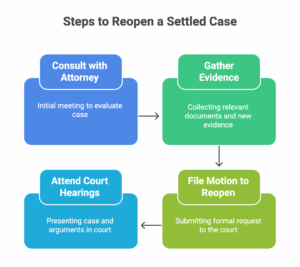So, you’ve settled your personal injury claim, but now you’re having second thoughts. Maybe your injuries are worse than you initially thought, or you feel pressured into accepting an offer that didn’t fully cover your losses. It happens more often than you think. But can you actually reopen your personal injury case? Let’s break down what you need to know.
Personal Injury Settlement Regrets? Understanding the Basics
A settlement is a legally binding agreement that resolves a personal injury claim. Once signed, it usually releases the responsible party from further liability. However, there are limited circumstances where you might be able to challenge this agreement and pursue further compensation. Think of it like this: a settlement is meant to be a period at the end of a sentence, but sometimes, you realize you missed a crucial word.
Why You Might Regret Your Personal Injury Settlement
Regret after a personal injury settlement can stem from various sources. Here are a few common examples:
- Undiscovered Injuries: You may have settled before fully understanding the extent of your injuries. For instance, someone involved in a car accident might settle for initial medical bills, only to discover months later that they have a severe, chronic back problem directly resulting from the accident. This situation can lead to substantial, unanticipated medical costs.
- Pressure from Insurance Companies: Insurance companies are notorious for pushing lowball offers, especially when you’re vulnerable and facing mounting bills. You might have felt cornered into accepting less than you deserve.
- Inadequate Legal Representation: A lawyer might have rushed you into settling, failed to properly investigate your claim, or not fully explained the implications of the settlement.
- Misunderstanding the Terms: Perhaps you didn’t fully grasp the legal jargon or weren’t aware of all the expenses covered (or not covered) by the settlement.
- New Evidence Emerges: Sometimes facts surface after the settlement that change the whole equation.
Can You Reopen Your Personal Injury Case? Grounds for Action
Reopening a settled personal injury case is challenging, but not impossible. The key lies in proving that the settlement agreement is invalid. Here are the most common grounds:
- Fraud: If the insurance company or the defendant intentionally misled you or concealed crucial information, you might have grounds to reopen the case. For example, if the defendant knew about a previous accident they caused at the same location but hid it during settlement negotiations, that would be considered fraud.
- Duress: If you were forced or threatened into accepting the settlement, it’s not considered a voluntary agreement.
- Mutual Mistake: If both parties were mistaken about a fundamental fact relating to the settlement – for instance, both believed the victim had no internal injuries, but it turns out they did – the agreement might be voidable. This is harder to prove than fraud.
- Mental Incapacity: If you lacked the mental capacity to understand the agreement at the time you signed it (due to medication, injury, or other factors), the settlement might be challenged.
Time is of the Essence: Deadlines for Reopening a Settlement
There are strict time limits (statutes of limitations) for reopening a case. These deadlines vary by state and depend on the specific grounds for challenging the settlement. Missing the deadline means you lose your right to pursue further action. Don’t delay; speak with an attorney as soon as you suspect a problem.
How to Reopen Your Case: Steps to Take and Evidence to Gather
Reopening a settled case involves a formal legal process:

- Consult with a Personal Injury Attorney: This is the crucial first step. An attorney can evaluate your case, determine if you have valid grounds to reopen the settlement, and advise you on the best course of action.
- Gather Evidence: Collect all relevant documents, including the original settlement agreement, medical records, police reports, correspondence with the insurance company, and any new evidence that supports your claim.
- File a Motion to Reopen the Case: Your attorney will draft and file a formal motion with the court, explaining the reasons why the settlement should be overturned and presenting your supporting evidence. This motion must adhere to specific court rules and procedures, which vary by state.
- Attend Court Hearings: The court will likely schedule hearings to consider your motion. Your attorney will present your case and argue why the settlement should be reopened.
Keep in mind that the burden of proof falls on you to demonstrate why the settlement is invalid. This can be a high hurdle to clear.
Building a Strong Case to Reopen Your Settlement
To successfully reopen your case, you’ll need compelling evidence. For example, imagine you settled a slip-and-fall case but later discovered the store owner knew about the hazardous condition for weeks prior but failed to address it. Obtaining internal memos or employee testimonies proving this knowledge could strengthen your case for fraud.
Finding the Right Personal Injury Lawyer to Fight For You
Reopening a personal injury case is a complex legal process. It’s essential to hire a skilled and experienced personal injury lawyer who specializes in settlement disputes. They’ll assess the strength of your claim, guide you through the legal process, and fight for your rights. Don’t settle for less than you deserve.





